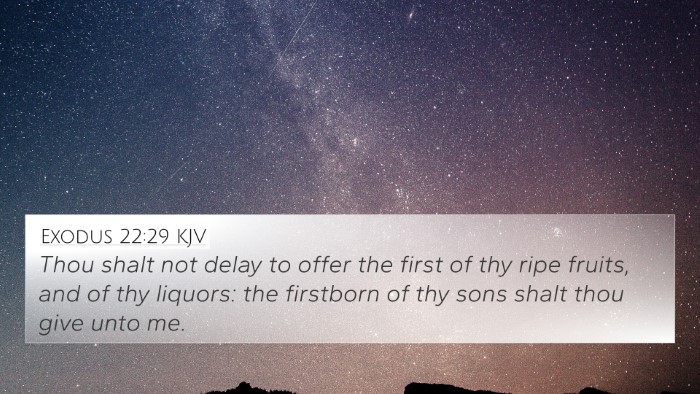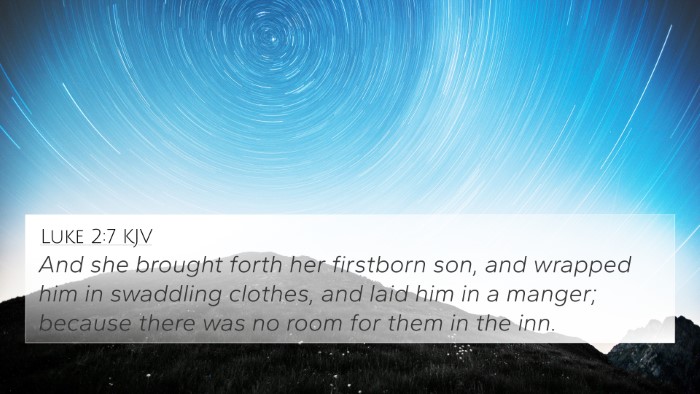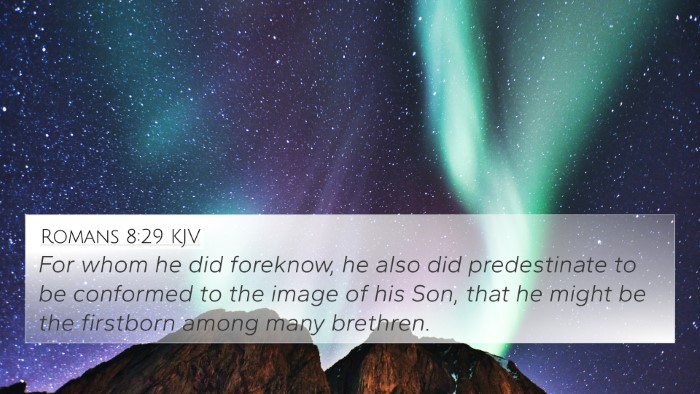Understanding Matthew 1:25
Matthew 1:25 states, "And knew her not till she had brought forth her firstborn son: and he called his name Jesus." This verse encapsulates the uniqueness of Jesus' birth and the integrity of Mary and Joseph's relationship. Below is a summarized interpretation of the verse drawing from the insights of Matthew Henry, Albert Barnes, and Adam Clarke.
Meaning and Insights
This verse highlights several theological themes including the virgin birth, the significance of Jesus' name, and the moral character of Joseph.
The Virgin Birth
Matthew Henry notes that the virgin birth was a profound miracle ordained by God, fulfilling the prophecy in Isaiah 7:14. The term “knew her not” emphasizes Joseph's respect for Mary’s purity and the divine nature of Jesus’ conception.
Joseph’s Integrity
Albert Barnes elaborates on Joseph's character, observing his righteousness. Joseph abstained from physical relations with Mary until after the birth of Jesus, showing his obedience to God's commands and his love for Mary.
The Name of Jesus
Adam Clarke explains the significance of the name "Jesus," which means "Savior." This not only identifies Jesus’ mission to save humanity from sin but also ties back to the genealogical themes present in the preceding verses of Matthew 1.
Cross-Referencing Biblical Texts
Understanding Matthew 1:25 also involves exploring its links to other scriptures. Here are some related Bible verses that enhance the understanding of this passage:
- Isaiah 7:14 - Prophesizes the virgin birth.
- Luke 1:34-35 - Further elaborates on the angel's announcement of Mary's virginity.
- John 1:14 - Declares the incarnation of the Word, tying to Jesus' divine nature.
- Galatians 4:4 - Highlights the fullness of time when Jesus was sent, affirming the significance of His birth.
- Luke 2:7 - Describes the humble circumstances of His birth.
- Philippians 2:7 - Speaks about Jesus taking the form of a servant, linked to the nature of His incarnation.
- Matthew 2:1 - Relates to the recognition of Jesus' kingship by the Magi.
- Romans 1:3 - Declares Jesus as descended from David according to the flesh, affirming His heritage.
- Hebrews 2:14 - Discusses Jesus' shared humanity, which is rooted in Matthew's account of His birth.
- 1 Timothy 3:16 - Affirms the mystery of godliness, focusing on Jesus' incarnation.
Thematic Connections
The examination of Matthew 1:25 invites us to recognize the overarching themes in the Bible concerning God’s plan for salvation. By cross-referencing this verse with others, we see a unified narrative that speaks to God’s intentions:
- Salvation and Redemption: Jesus’ birth signifies the beginning of a new covenant and God's promise of redemption.
- God’s Intervention: This verse emphasizes that God intervenes in human history to fulfill His plans.
- Fulfillment of Prophecy: The connection to Isaiah speaks volumes about God’s faithfulness to His promises.
- The Perfection of God’s Timing: All events surrounding Jesus' birth highlight divine timing aligned with God's plan for humanity.
- The Nature of Jesus: The verse serves as a vital point to discuss Jesus' dual nature—fully God and fully man.
Conclusion
In summary, Matthew 1:25 not only conveys the miraculous nature of Jesus' birth but also nestled within it are themes of prophecy fulfillment, moral integrity, and the profound significance of Jesus as the Savior. By employing cross-referencing Bible study methods, we strengthen our understanding and appreciation for the depths of Scripture.
Tools for Bible Cross-Referencing
To further delve into such connections within the Bible, consider using:
- Bible concordance to locate verses quickly.
- Bible cross-reference guide to understand relationships between texts.
- Cross-reference Bible study methods to deepen your engagement with scripture.
Understanding Related Content
For those asking questions like "What verses are related to Matthew 1:25?" or "How do Philippians 2:7 and Matthew 1:25 connect?", cross-referencing can provide a clearer picture of themes and theological principles in the Bible.








